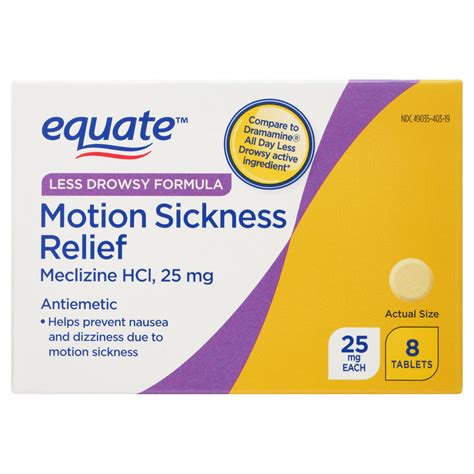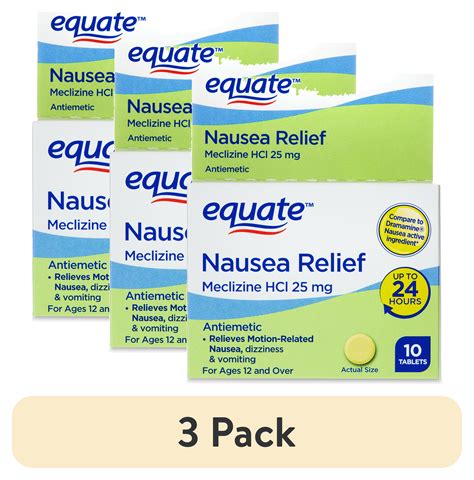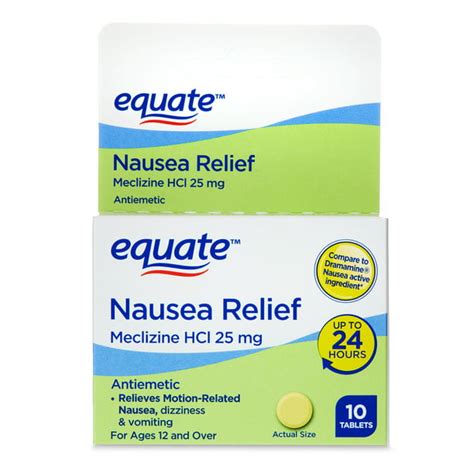Intro
Discover Meclizine for nausea relief, an antihistamine that alleviates vertigo, dizziness, and motion sickness symptoms, providing effective treatment for nausea and vomiting, with benefits and uses explained.
Nausea is a common symptom that can be caused by a variety of factors, including motion sickness, vertigo, and other medical conditions. For many people, nausea can be debilitating and disrupt daily life. Fortunately, there are several treatment options available, including meclizine, an antihistamine that is commonly used to relieve nausea and vomiting. In this article, we will explore the use of meclizine for nausea relief, including its benefits, working mechanisms, and potential side effects.
Meclizine is an over-the-counter medication that has been used for decades to treat nausea and vomiting caused by motion sickness, vertigo, and other conditions. It is available in various forms, including tablets, capsules, and chewable tablets. Meclizine works by blocking the effects of histamine, a chemical that is involved in the transmission of nerve impulses in the brain and inner ear. By blocking histamine, meclizine helps to reduce the symptoms of nausea and vomiting.
The importance of finding effective treatments for nausea cannot be overstated. Nausea can have a significant impact on a person's quality of life, making it difficult to perform daily activities, enjoy social events, and even maintain a healthy diet. Furthermore, nausea can be a symptom of underlying medical conditions, such as gastrointestinal disorders or neurological diseases, which require prompt medical attention. Therefore, it is essential to understand the available treatment options, including meclizine, and how they can be used to relieve nausea and improve overall health.
How Meclizine Works

Meclizine is also thought to have a sedative effect, which can help to reduce anxiety and promote relaxation. This sedative effect can be beneficial for people who experience nausea and vomiting caused by anxiety or stress. Additionally, meclizine has been shown to have a mild anti-inflammatory effect, which can help to reduce inflammation and relieve symptoms of nausea and vomiting.
Benefits of Meclizine for Nausea Relief
The benefits of meclizine for nausea relief are numerous. Meclizine is an effective treatment for nausea and vomiting caused by motion sickness, vertigo, and other conditions. It is also relatively safe and well-tolerated, with few side effects reported. Meclizine is available over-the-counter, making it easily accessible to people who need it. Additionally, meclizine is relatively inexpensive, making it a cost-effective treatment option for nausea relief.Some of the key benefits of meclizine for nausea relief include:
- Fast-acting relief: Meclizine can provide fast-acting relief from nausea and vomiting, often within 30 minutes to an hour after taking the medication.
- Long-lasting relief: Meclizine can provide long-lasting relief from nausea and vomiting, often lasting for several hours after taking the medication.
- Safe and well-tolerated: Meclizine is relatively safe and well-tolerated, with few side effects reported.
- Affordable: Meclizine is relatively inexpensive, making it a cost-effective treatment option for nausea relief.
How to Take Meclizine for Nausea Relief

It is essential to note that meclizine is not suitable for everyone, particularly children under 12 years old, pregnant women, and people with certain medical conditions, such as glaucoma or urinary retention. If you are unsure about taking meclizine, consult with your doctor or pharmacist for advice.
Potential Side Effects of Meclizine
While meclizine is generally safe and well-tolerated, it can cause some side effects. Some of the potential side effects of meclizine include: * Drowsiness: Meclizine can cause drowsiness, which can be beneficial for people who experience nausea and vomiting caused by anxiety or stress. * Dry mouth: Meclizine can cause dry mouth, which can be relieved by drinking plenty of water. * Blurred vision: Meclizine can cause blurred vision, which can be a problem for people who need to drive or operate heavy machinery. * Constipation: Meclizine can cause constipation, which can be relieved by increasing fiber intake and staying hydrated.To minimize the risk of side effects, it is essential to follow the recommended dose and take meclizine as directed. If you experience any side effects, consult with your doctor or pharmacist for advice.
Alternative Treatments for Nausea Relief

It is essential to consult with your doctor or pharmacist before trying any alternative treatments, particularly if you have an underlying medical condition or are taking other medications.
Natural Remedies for Nausea Relief
In addition to meclizine and alternative treatments, there are natural remedies that can help to relieve nausea and vomiting. Some of the natural remedies for nausea relief include: * Drinking plenty of water: Staying hydrated can help to reduce nausea and vomiting. * Eating small, frequent meals: Eating small, frequent meals can help to reduce nausea and vomiting. * Avoiding triggers: Avoiding triggers, such as certain foods or smells, can help to reduce nausea and vomiting. * Practicing relaxation techniques: Practicing relaxation techniques, such as deep breathing or meditation, can help to reduce anxiety and promote relaxation.Conclusion and Final Thoughts

If you are experiencing nausea and vomiting, it is essential to consult with your doctor or pharmacist to determine the best course of treatment. With the right treatment and self-care strategies, it is possible to manage nausea and vomiting and improve overall health and well-being.
We invite you to share your thoughts and experiences with meclizine and other treatments for nausea relief. Have you used meclizine or other treatments to relieve nausea and vomiting? What were your experiences, and what tips can you share with others? Please comment below and share this article with others who may be interested in learning more about meclizine and other treatments for nausea relief.
What is meclizine used for?
+Meclizine is used to treat nausea and vomiting caused by motion sickness, vertigo, and other conditions.
How does meclizine work?
+Meclizine works by blocking the effects of histamine on the brain and inner ear, reducing the stimulation of the vomiting center and relieving the symptoms of nausea and vomiting.
What are the potential side effects of meclizine?
+The potential side effects of meclizine include drowsiness, dry mouth, blurred vision, and constipation.
Can I take meclizine with other medications?
+It is essential to consult with your doctor or pharmacist before taking meclizine with other medications, as it can interact with certain medications and increase the risk of side effects.
Is meclizine safe for children and pregnant women?
+Meclizine is not suitable for children under 12 years old and pregnant women, as it can cause harm to the developing fetus or infant.
